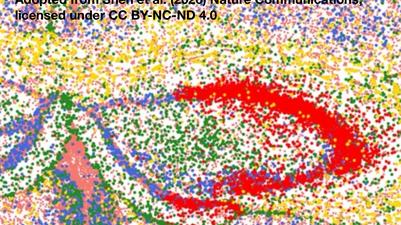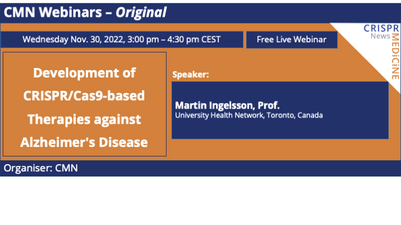Disease name: Alzheimer's disease
ICD-10 Disease Code: G30 - Alzheimer's disease
ICD-10 Disease Group: G30-G32 - Other degenerative diseases of the nervous system
General description:Alzheimer’s disease (AD) is the most common form of dementia, a disease of the brain that seriously impairs an individual’s ability to carry out normal everyday activities. AD is a progressive, neurodegenerative disease that causes gradual loss of memory, confusion, changes in behaviour and difficulty in thinking. The disease often begins with confusion and mild memory loss and develops over time. AD develops slowly, involving parts of the brain that control thought, memory, and language. Over time, AD can progress, leading to debilitating cognitive dysfunction. Individuals may be unable to recognise family members, or have trouble speaking, reading or writing or doing simple tasks.
It is not yet fully understood what causes AD and it is likely caused by several contributing factors that can affect each person differently over an individual's lifetime. These factors include age, lifestyle, and family history. Early-onset autosomal dominant Alzheimer's disease (EOAD) is a type of genetic AD with an earlier age of onset, usually before 60 years old and is caused by specific genetic mutations. Approximately 60% of these cases are familial AD. Late-onset familial AD is associated with a separate genetic mutation. AD can be divided into four subtypes, each of which correlate with different mutations. EOAD includes Alzheimer’s disease type 1, type 3 and type 4. Late-onset Alzheimer’s disease consists of the subtype AD type 2 and is associated with a higher risk of developing AD.
Mutations:Type 1 AD is caused by mutations in the APP gene.
Type 2 AD is associated with the APOE*4 allele on chromosome 9.
Type 3 AD is caused by mutations in the PSEN1 gene.
Type 4 AD is caused by mutations in the PSEN2 gene.
Disease frequency:In 2020 approximately, 5.8 million Americans aged 65 or above were diagnosed with Alzheimer’s disease. AD is one of the top 10 leading causes of death in the United States.
Approximately 25% of all AD is familial, and EOAD represents less than 1% of all cases.
Symptoms:The first sign of Alzheimer’s disease is difficulties with memory. The disease progresses over time and can include memory loss that can disrupt normal life, difficulty completing simple and familiar tasks, poor judgement, and changes in mood and behaviour. The average age of onset is around 65 and the disease develops slowly before progressing to cause debilitating cognitive dysfunction and death.
Treatment:There is currently no cure for Alzheimer’s disease. Treatment is based around alleviating symptoms and improving the quality of life of individuals suffering from AD.
Steps can be taken to help maintain brain health and to manage behavioural symptoms.
Some drugs can help to slow the progression of symptoms for a period of time. Cholinesterase inhibitors and partial N-methyl-D-aspartate antagonists may be used as symptomatic treatment. In some cases psychotropic drugs may also prove useful to treat symptoms involving behaviour or mood problems.
Sources:- https://www.icd10data.com/
- https://www.orpha.net/consor/cgi-bin/index.php
- https://rarediseases.org/
- https://medlineplus.gov/genetics/
- https://www.cdc.gov/





